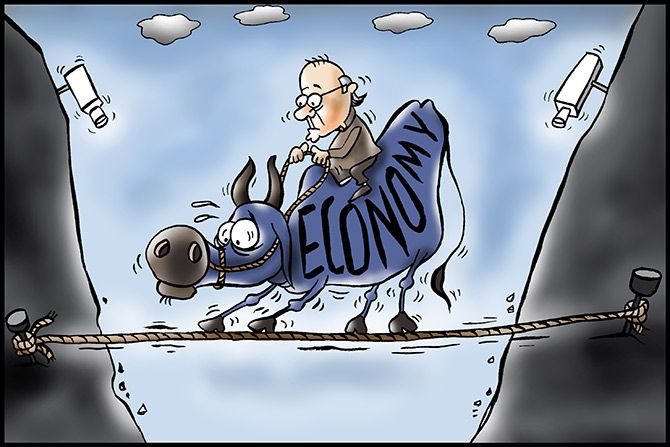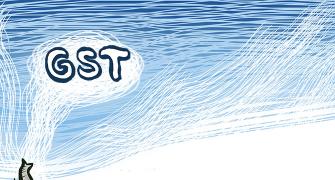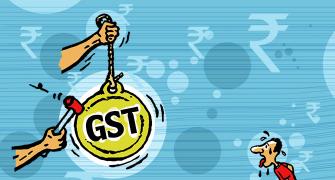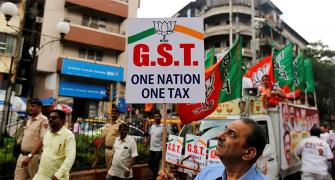'A broad-based revival of private sector investment was likely in 2018-19 after businesses had successfully made the switch to the GST.'
Illustration: Uttam Ghosh/Rediff.com

The Goods and Services Tax (GST) might adversely affect economic growth in the initial part of 2017-18 before providing a boost from the fourth quarter onwards, economists said.
They added retail price inflation would largely remain unaffected but inflationary expectations would persist as prices would rise for services such as premium air travel and air-conditioned hotels as well as goods such as aerated drinks, hybrid cars and fertilisers.
These items have negligible weights in the consumer price index (CPI).
Rigid inflationary expectations would not allow inflation to decline significantly, though taxes paid on inputs would be reimbursed, which would have a damping effect on inflation, some economists said.
Also, the wholesale price index-based inflation will not be affected by the GST due to a new way of calculating price rise that does not take into account indirect taxes.
"The GDP will be negatively impacted for at least two quarters by the GST as there will be transitional problems and people will be adjusting to the new tax regime," said DK Srivastava of EY.
He said economic growth could be affected by up to 0.5 percentage points during this period.
He pegs GDP growth at 7 per cent in 2017-18, a shade lower than 7.1 per cent in 2016-17.
GDP growth in April-June would be weak due to the effects of demonetisation, he added.
The government's move to withdraw currency notes of Rs 500 and Rs 1,000 dented economic growth, which was 6.1 per cent in January-March against 7 per cent in October-December.
Srivastava said the effects of demonetisation on economic growth could dissipate in the second and third quarters of 2017-18, but the economy could come under pressure from the transition to the GST.
"The second and third quarters are likely to witness some adjustment as assessees become accustomed to new compliance procedures and higher working capital requirements.
The positive effect of the GST on economic activity is likely to be visible from the fourth quarter," said Aditi Nayar, principal economist with ICRA.
She said a broad-based revival of private sector investment was likely in 2018-19 after businesses had successfully made the switch to the GST.
Earlier, Finance Minister Arun Jaitley had said the GST has a potential to raise the GDP growth by 1-2 percentage points.
The GST would boost the GDP through efficiency gains as compliance improved, said Devendra Pant, chief economist with India Ratings.
“But this will play out over the medium to long term. In the immediate future, the impact on government revenues cannot be ruled out,” he added.
Soumya Kanti Ghosh, chief economist with the State Bank of India group, said the GST had the potential to add at least 1 percentage point to India’s GDP.
“This will lead to creation of more employment and increases in productivity,” he added.
Madan Sabnavis, chief economist at CARE Ratings, said gains to GDP growth would come from the accounting side and not from any improvements in efficiency.
He said the unorganised sector would be more accurately captured once the GST came into effect.
He did not expect prices to fall significantly enough to push demand and did not rule out the possibility of an upward pressure on prices in the short run until all players adjusted to the new tax.
However, Srivastava said the GST might reduce CPI inflation.
Nayar said the effective tax rate after adjusting for input tax credit and removal of cascading taxes was intended to be reduced on most items in the GST regime.
Moreover, a large portion of goods and some services in the CPI basket were in the exempt category, she added.
Food items constitute 45 per cent of the CPI and agriculture produce is exempt from the GST. However, packaged food will attract the GST.
According to some economists, 32 per cent of the CPI will be unaffected by the GST and the remaining 13 per cent among food items will be affected.
However, decisions pending on area-based exemptions and export promotion schemes could affect output prices for some companies and exporters, Nayar said.
She added the standard rate for services had been kept at 18 per cent and some services were to be taxed at 28 per cent, which was not expected as this was higher than the existing levy of 15 per cent, inclusive of various cesses.
However, the availability of input tax credit may soften the impact of the GST on services inflation.
A potential rise in prices for items that had a marginal or zero weight in the CPI basket, such as premium air travel and hotels, entertainment and fertilisers, could keep inflationary expectations stubborn, she said.
The GST Council decided to raise the threshold of air-conditioned room rates in hotels that faced the 28 per cent tax rate to Rs 7,500 from Rs 5,000 proposed earlier.
Room rates in the range of Rs 2,500-7,500 will attract the 18 per cent rate.
Aerated drinks and hybrid cars, which will face a cess above the 28 per cent tax rate, will become costlier, but they have negligible weights in the CPI.
Cold beverages have a 0.85 per cent weight and motor vehicles have a 0.48 per cent weight.
Pant said most tax rates under the GST were close to existing tax rates, so at the aggregate level, it was unlikely that inflation would be triggered.
“But one cannot rule out short-term disruptions in supply,” he added.
Ghosh said there would be competitive pricing due to reduction in taxes paid on goods and services, like a 15-20 per cent reduction in logistics costs of non-bulk goods.










